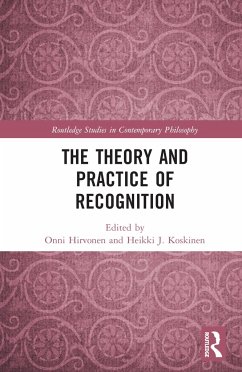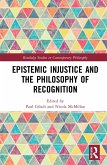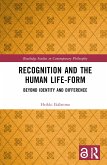The Theory and Practice of Recognition
Herausgeber: Hirvonen, Onni; Koskinen, Heikki J.
The Theory and Practice of Recognition
Herausgeber: Hirvonen, Onni; Koskinen, Heikki J.
- Gebundenes Buch
- Merkliste
- Auf die Merkliste
- Bewerten Bewerten
- Teilen
- Produkt teilen
- Produkterinnerung
- Produkterinnerung
This volume presents new essays on the theory and practice of recognition. In order to retain its overall plausibility as a critical social theory, contemporary recognition theory needs to be able to successfully combine theory with real-life perspectives, in both contemporary and historical contexts.
Andere Kunden interessierten sich auch für
![The Theory and Practice of Recognition The Theory and Practice of Recognition]() The Theory and Practice of Recognition63,99 €
The Theory and Practice of Recognition63,99 €![The Politics of Recognition in the Age of Digital Spaces The Politics of Recognition in the Age of Digital Spaces]() Benjamin JJ CarpenterThe Politics of Recognition in the Age of Digital Spaces152,99 €
Benjamin JJ CarpenterThe Politics of Recognition in the Age of Digital Spaces152,99 €![Descent of the Dialectic Descent of the Dialectic]() Michael J. ThompsonDescent of the Dialectic137,99 €
Michael J. ThompsonDescent of the Dialectic137,99 €![Epistemic Injustice and the Philosophy of Recognition Epistemic Injustice and the Philosophy of Recognition]() Epistemic Injustice and the Philosophy of Recognition142,99 €
Epistemic Injustice and the Philosophy of Recognition142,99 €![Epistemic Injustice and the Philosophy of Recognition Epistemic Injustice and the Philosophy of Recognition]() Epistemic Injustice and the Philosophy of Recognition42,99 €
Epistemic Injustice and the Philosophy of Recognition42,99 €![Recognition and the Human Life-Form Recognition and the Human Life-Form]() Heikki IkäheimoRecognition and the Human Life-Form42,99 €
Heikki IkäheimoRecognition and the Human Life-Form42,99 €![Recognition and the Human Life-Form Recognition and the Human Life-Form]() Heikki IkäheimoRecognition and the Human Life-Form142,99 €
Heikki IkäheimoRecognition and the Human Life-Form142,99 €-
-
-
This volume presents new essays on the theory and practice of recognition. In order to retain its overall plausibility as a critical social theory, contemporary recognition theory needs to be able to successfully combine theory with real-life perspectives, in both contemporary and historical contexts.
Hinweis: Dieser Artikel kann nur an eine deutsche Lieferadresse ausgeliefert werden.
Hinweis: Dieser Artikel kann nur an eine deutsche Lieferadresse ausgeliefert werden.
Produktdetails
- Produktdetails
- Routledge Studies in Contemporary Philosophy
- Verlag: Taylor & Francis Ltd
- Seitenzahl: 346
- Erscheinungstermin: 23. September 2022
- Englisch
- Abmessung: 235mm x 157mm x 23mm
- Gewicht: 602g
- ISBN-13: 9781032195070
- ISBN-10: 103219507X
- Artikelnr.: 64360036
- Herstellerkennzeichnung
- Libri GmbH
- Europaallee 1
- 36244 Bad Hersfeld
- gpsr@libri.de
- Routledge Studies in Contemporary Philosophy
- Verlag: Taylor & Francis Ltd
- Seitenzahl: 346
- Erscheinungstermin: 23. September 2022
- Englisch
- Abmessung: 235mm x 157mm x 23mm
- Gewicht: 602g
- ISBN-13: 9781032195070
- ISBN-10: 103219507X
- Artikelnr.: 64360036
- Herstellerkennzeichnung
- Libri GmbH
- Europaallee 1
- 36244 Bad Hersfeld
- gpsr@libri.de
Onni Hirvonen is Senior Researcher in philosophy in the Department of Social Sciences and Philosophy at the University of Jyväskylä. His main interests are in Hegelian philosophies of recognition and contemporary social ontology. His recent publications in these areas include the peer-reviewed articles "Recognition and Civic Selection" (2021), "The Problem of the First Belief: Group Agents and Responsibility" (2020), and "Recognitive Arguments for Workplace Democracy" (with Keith Breen, 2020). He has edited a book on the philosophy and politics of recognition in Finnish (2020). Heikki J. Koskinen is a PhD and a docent of theoretical philosophy. He works as a Senior Advisor at the University of Helsinki, Finland. Koskinen is the author of From a Metaphilosophical Point of View: A Study of W. V. Quine's Naturalism (2004). He has co-edited several books including Categories of Being: Essays on Metaphysics and Logic (2012) and Recognition and Religion: Contemporary and Historical Perspectives (Routledge, 2019). Koskinen's recent journal publications include "Antecedent Recognition: Some Problematic Educational Implications of the Very Notion" (2018), "Mediational Recognition and Metaphysical Power: A Systematic Analysis" (2020), and "Recognition, Identity, and Authenticity in the Blues" (2021).
The Theory and Practice of Recognition: An Introduction, Onni Hirvonen and
Heikki J. Koskinen
I Recognition, Personal Life, and the Constitution of the Self
1. Authenticity and the Problem of Social Recognition, Cillian McBride
2. Recognition and the Human Life-Form: Towards an Anthropological Turn in
Critical Theory, Heikki Ikäheimo
3. Mutual Recognition and Well-Being: What Is It for Relational Selves to
Thrive?, Arto Laitinen
4. Recognition: Intersubjectivity and Self-Respect, Antje Gimmler
5. Varieties of Social Invisibilization and Non-person Treatment,
Carl-Göran Heidegren
6. The Gift Model of Recognition, Veronika Hoffmann
II Political Practice and the Theory of Recognition
7. Populism, Polarization, and Misrecognition, Christopher F. Zurn
8. The Environment of Recognition, Simon Thompson
9. Creating Irrelations: The #MeToo Phenomenon in the Light of Recognition
Theory, Jaana Hallamaa
10. How to Criticize? On Honneth's Method, Mikael Carleheden
11. Emancipation and Interpretation of Norms in Contemporary Recognition
Theory, Heikki J. Koskinen
12. Institutionally Mediated Recognition: A Vicious Circle?, Onni Hirvonen
III Historical and Religious Practices of Recognition
13. Recognition and Fides: Old and New Paths of Conceptual History, Risto
Saarinen
14. "I Am Not Like Other People!" Desire for Esteem within the Community of
Equals, Ritva Palmén
15. Citizens and the Criteria for Recognition in the Roman Empire,
Maijastina Kahlos
16. Beyond the Theory-Practice Dichotomy: Pragmatism, Antitheodicy, and the
Recognition of Suffering, Sami Pihlström
Heikki J. Koskinen
I Recognition, Personal Life, and the Constitution of the Self
1. Authenticity and the Problem of Social Recognition, Cillian McBride
2. Recognition and the Human Life-Form: Towards an Anthropological Turn in
Critical Theory, Heikki Ikäheimo
3. Mutual Recognition and Well-Being: What Is It for Relational Selves to
Thrive?, Arto Laitinen
4. Recognition: Intersubjectivity and Self-Respect, Antje Gimmler
5. Varieties of Social Invisibilization and Non-person Treatment,
Carl-Göran Heidegren
6. The Gift Model of Recognition, Veronika Hoffmann
II Political Practice and the Theory of Recognition
7. Populism, Polarization, and Misrecognition, Christopher F. Zurn
8. The Environment of Recognition, Simon Thompson
9. Creating Irrelations: The #MeToo Phenomenon in the Light of Recognition
Theory, Jaana Hallamaa
10. How to Criticize? On Honneth's Method, Mikael Carleheden
11. Emancipation and Interpretation of Norms in Contemporary Recognition
Theory, Heikki J. Koskinen
12. Institutionally Mediated Recognition: A Vicious Circle?, Onni Hirvonen
III Historical and Religious Practices of Recognition
13. Recognition and Fides: Old and New Paths of Conceptual History, Risto
Saarinen
14. "I Am Not Like Other People!" Desire for Esteem within the Community of
Equals, Ritva Palmén
15. Citizens and the Criteria for Recognition in the Roman Empire,
Maijastina Kahlos
16. Beyond the Theory-Practice Dichotomy: Pragmatism, Antitheodicy, and the
Recognition of Suffering, Sami Pihlström
The Theory and Practice of Recognition: An Introduction, Onni Hirvonen and
Heikki J. Koskinen
I Recognition, Personal Life, and the Constitution of the Self
1. Authenticity and the Problem of Social Recognition, Cillian McBride
2. Recognition and the Human Life-Form: Towards an Anthropological Turn in
Critical Theory, Heikki Ikäheimo
3. Mutual Recognition and Well-Being: What Is It for Relational Selves to
Thrive?, Arto Laitinen
4. Recognition: Intersubjectivity and Self-Respect, Antje Gimmler
5. Varieties of Social Invisibilization and Non-person Treatment,
Carl-Göran Heidegren
6. The Gift Model of Recognition, Veronika Hoffmann
II Political Practice and the Theory of Recognition
7. Populism, Polarization, and Misrecognition, Christopher F. Zurn
8. The Environment of Recognition, Simon Thompson
9. Creating Irrelations: The #MeToo Phenomenon in the Light of Recognition
Theory, Jaana Hallamaa
10. How to Criticize? On Honneth's Method, Mikael Carleheden
11. Emancipation and Interpretation of Norms in Contemporary Recognition
Theory, Heikki J. Koskinen
12. Institutionally Mediated Recognition: A Vicious Circle?, Onni Hirvonen
III Historical and Religious Practices of Recognition
13. Recognition and Fides: Old and New Paths of Conceptual History, Risto
Saarinen
14. "I Am Not Like Other People!" Desire for Esteem within the Community of
Equals, Ritva Palmén
15. Citizens and the Criteria for Recognition in the Roman Empire,
Maijastina Kahlos
16. Beyond the Theory-Practice Dichotomy: Pragmatism, Antitheodicy, and the
Recognition of Suffering, Sami Pihlström
Heikki J. Koskinen
I Recognition, Personal Life, and the Constitution of the Self
1. Authenticity and the Problem of Social Recognition, Cillian McBride
2. Recognition and the Human Life-Form: Towards an Anthropological Turn in
Critical Theory, Heikki Ikäheimo
3. Mutual Recognition and Well-Being: What Is It for Relational Selves to
Thrive?, Arto Laitinen
4. Recognition: Intersubjectivity and Self-Respect, Antje Gimmler
5. Varieties of Social Invisibilization and Non-person Treatment,
Carl-Göran Heidegren
6. The Gift Model of Recognition, Veronika Hoffmann
II Political Practice and the Theory of Recognition
7. Populism, Polarization, and Misrecognition, Christopher F. Zurn
8. The Environment of Recognition, Simon Thompson
9. Creating Irrelations: The #MeToo Phenomenon in the Light of Recognition
Theory, Jaana Hallamaa
10. How to Criticize? On Honneth's Method, Mikael Carleheden
11. Emancipation and Interpretation of Norms in Contemporary Recognition
Theory, Heikki J. Koskinen
12. Institutionally Mediated Recognition: A Vicious Circle?, Onni Hirvonen
III Historical and Religious Practices of Recognition
13. Recognition and Fides: Old and New Paths of Conceptual History, Risto
Saarinen
14. "I Am Not Like Other People!" Desire for Esteem within the Community of
Equals, Ritva Palmén
15. Citizens and the Criteria for Recognition in the Roman Empire,
Maijastina Kahlos
16. Beyond the Theory-Practice Dichotomy: Pragmatism, Antitheodicy, and the
Recognition of Suffering, Sami Pihlström








